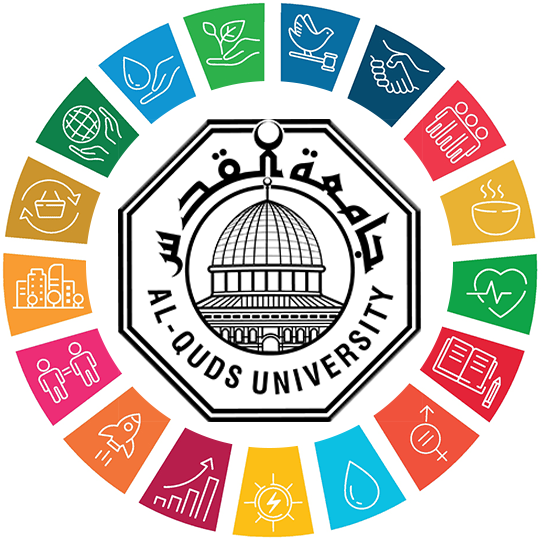Progress to SDG 4 (Quality Education)
As 2025 approaches, Al-Quds University remains at the forefront of the national advancements towards the 4th Sustainable Development Goal (Quality Education) via a comprehensive, innovative, and sustainability-focused educational model. The University also prides itself on educational excellence and offers a range of multidisciplinary undergraduate and postgraduate programs including, but not limited to, the arts, humanities, social sciences, natural sciences, health sciences, and engineering. All programs are built to advance critical thinking, creativity, problem solving, and interdisciplinary teamwork preparing future generations to flourish within a dynamic global environment.
Educational inclusiveness and accessibility are cornerstones of Al-Quds University’s mission. The University expands its scholarship and financial outreach frameworks to ensure students from economically disadvantaged and marginalized communities are given the opportunity to attain a higher education. The steps echo the institution’s strong advocacy of equity, social mobility, and the right of every individual to lifelong learning opportunities.
Research and innovation is a key pillar of all academic programs. Al-Quds University aims to advance the teaching and learning of the discipline by encouraging students and faculty to participate in research projects with social, scientific, and technological value. The University the offers preparation, upskilling, reskilling, and continuing education to support the personal and professional journeys of its constituents at all levels.
Al-Quds University takes great pride in the incorporation of sustainability and environmental education into its numerous programs and curricula. It offers degree programs in environmental science and the integration of sustainable development with programs that focus on “climate change education” and “renewable energy” within its curricula. The Master of Renewable Energy and Sustainability, Master of Water Science Innovations, Master of Sustainable Development, and Bachelor of Professional in Solar Energy Technology (PSET) are just some of the programs offered. Students complete these programs with the skills needed to respond to environmentally and developmentally critical issues locally and globally.
In addition, Al-Quds University continues to be an active participant in the global “Race to Zero” campaign in which the University promotes the pledge of achieving net-zero carbon emissions by 2050. The University’s advocacy of environmental education and its goal of empowering students and surrounding communities are a demonstration of the institution’s role in fostering a sustainable and just future.
Goal 4 seeks to ensure equitable quality education and lifelong learning opportunities for all by eliminating gender disparities in education. It also aims to guarantee that those most disadvantaged, including persons with disabilities, indigenous peoples, and children in vulnerable situations, have equitable access to all levels of education and vocational training.
Al-Quds University values the importance of education in empowering people and sustainable development. Quality education for all is one of the priorities for the University. This is how the University addresses SDG 4:
Al-Quds University expands education. The University provides entry and advanced training in many different programs within the liberal and health sciences, the arts, engineering and technology, and multi and cross integrated degrees. The University encourages and formulates programs that facilitate and promote analytical, critical, and creative thinking and reasoning formation/endowment and problem resolution.
Defending social integration of education and social equity with outreach in the community, financial aid, and scholarships, and programs for the economically disadvantaged, prejudged and neglected communities, the University facilitates the integration of education for the economically disadvantaged, prejudged and integrated and outreach in the community.
Al-Quds University places anti-violence and seclusion programs and centers and resources on student success and achievement. For the counseling and tutoring assistance, the University proposes and integrates multi and cross integrated programs and resources for the counseling and programs and resources directed and integrated on student achievement.
Research and Innovation: The university fosters a culture of research and innovation and allows its students and faculty members to work on advanced projects and participate in knowledge creation within their fields. The engagement in research helps to socially, economically, and technologically advance the educational experience of students and enriches their educational experience.
Lifelong Learning Opportunities: Understanding the need and significance of lifelong learning, Al-Quds University runs continuing education programs, professional development courses, and community workshops that meet a variety of learning needs. These programs and community workshops help individuals develop competencies, renew their knowledge, and keep their competitive edge in an ever-changing environment.
Promotion of Sustainable Development and Global Citizenship: Al-Quds University embeds the principles of sustainability and global citizenship into the fabric of its programs, prompting students to social, economically, and environmentally assess the results of their actions and become socially responsible global citizens. The university encourages socially responsible extracurricular activities, such as clubs and volunteer work, to promote social engagement.
To finish, Al-Quds University is achieving SDG 4 through diverse academic programs, equitable educational access, research, innovation, and a student-centered learning atmosphere focused on integrating continued education and global citizenship, as well as forming partnerships and alliances. Providing a comprehensive and quality education, the University contributes to the empowerment of people and communities and, through:
• Driving the establishment of numerous accredited academic programs at the diploma, bachelor’s, master’s, and doctoral levels, and in varied disciplines.
• Ensuring educational materials and educational resources, including libraries, centers and institutes, laboratories and distance lectures, are open to all.
• Organizing open educational activities, such as courses, conferences, and workshops, for all audiences.
• Supporting educational outreach through community school visits, volunteer work by faculty members, university students, and community members.
• Practicing a non-discriminatory educational access policy to all programs and educational activities, irrespective of race, religion, disability or gender.
• Collaborating with educational institutions in facilitating the development of strategic plans directed at the higher education system in Palestine.
• Providing numerous faculty and student international educational and research exchange opportunities.
